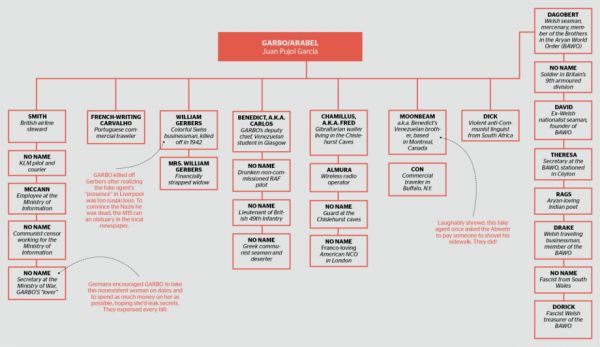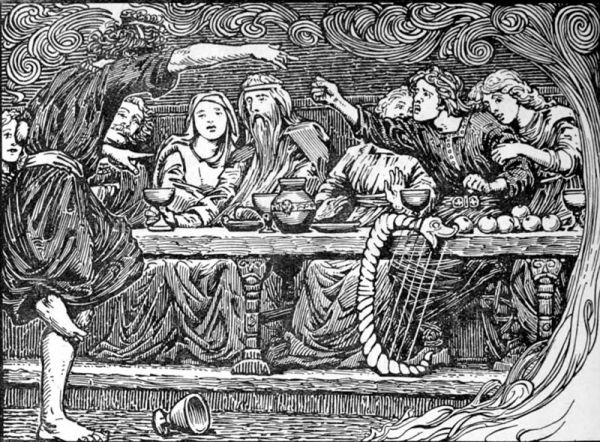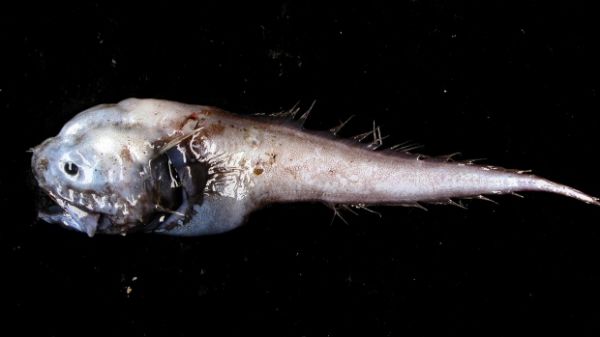How a chicken farmer, a pair of princesses, and 27 imaginary spies helped the Allies win World War II.

In
the weeks leading up to D-day, Allied commanders had their best game
faces on. “This operation is not being planned with any alternatives,”
barked General Dwight D. Eisenhower. “This operation is planned as a
victory, and that’s the way it’s going to be!” Indeed, more than 6,000
ships were ready to cruise across the English Channel to plant the
first wave of two million troops on the white beaches of Normandy.
Nearly 20,000 vehicles would crawl ashore as 13,000 planes dropped
thousands of tons of explosives and thousands of paratroopers.
The
sheer size of the invasion—it would be the largest in history—was
staggering. But so were the stakes. With the first day’s casualty rate
expected to reach 90 percent and the outcome of World War II hanging in
the balance, the truth was that Eisenhower was riddled with doubt. He’d
transformed into an anxious chimney, puffing four packs of cigarettes a
day. Other Allied leaders felt equally unsure. “I see the tides
running red with their blood,” Winston Churchill lamented. General
George S. Patton privately complained of feeling “awfully restless.”
Chief of the Imperial General Staff Alan Brooke was more blunt: “It
won’t work,” he said. The day before the invasion, Eisenhower quietly
penciled a note accepting blame in case he had to order retreat. When
he watched the last of the 101st Airborne Division take off, the steely
general started to cry.
They were worried for good reason. With
so many troops and so much artillery swelling in England, it was
impossible to keep the attack a secret. Hitler knew it was coming, and
he’d been preparing a defense for months. Only one detail eluded him,
and he was confident in a Nazi victory if he could figure it out—he
needed to know where, exactly, the attack would happen. To make D-day a
success, the Allies needed to keep him in the dark: They’d have to
trick the Germans into thinking the real invasion was just a bluff,
while making it seem like a major attack was imminent elsewhere. The
task seemed impossible, but luckily, the British had a secret weapon: a
short, young balding Spaniard. He was the king of con men, an amateur
spy gone pro, the world’s sneakiest liar. He was also, of all things, a
chicken farmer.
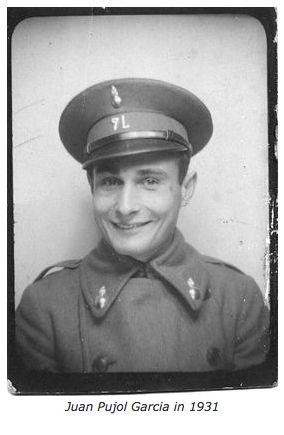 Juan Pujol Garcia had been working at a hotel
Juan Pujol Garcia had been working at a hotel
when he decided to become a spy. Although he was born to a wealthy
Barcelona family in 1912, Pujol had squandered his privileges. To the
disappointment of his family, he dropped out of boarding school at 15,
eventually enrolling instead at an academy for poultry farmers. At 21,
he served six months of mandatory military service, but army life wasn’t
for him: The pacifist ditched the cavalry and bought a movie theater.
When that venture failed, he bought a smaller theater, which flopped
too. Success chronically eluded him. By 24, Pujol had resigned himself
to working on a sinking chicken farm and marrying a girl he wasn't sure
he loved. His life was normal, if not boring.
But life in 1930s
Spain was anything but boring. In 1931, King Alfonso XIII sensed his
popularity crumbling and fled the country without formally abdicating,
leaving Spain a political vacuum. Communist and Fascist groups
violently fought for power. Bullrings became theaters for public
massacres, and the corpses of politicians littered Madrid’s alleys.
When
Spain plunged into civil war in July 1936, Pujol was supposed to
report for duty, but he fled instead. He was soon caught and thrown in
prison. Then, after unwittingly joining a jailbreak, he bolted to a safe
house in Barcelona. He never saw his fiancée again. More than a year
passed, and in 1938, a depressed and emaciated Pujol emerged from
hiding. The escapee looked so bad, he was able to forge a document
saying he was too old for the army. It would be the first of a growing
snowball of lies.
Desperate for money, Pujol eventually landed a job managing a dumpy
Madrid hotel ironically named the Majestic. The walls were grubby and
the heating was shoddy, but in a certain sense, he had found a home. He
was a passionate small-talker, and a hotel was a great place to meet
people. And those people could be his ticket out of war-torn Spain.
One
day, the Spanish Duke of Torre walked into the hotel and asked for a
room. Pujol struck up a conversation about parties, which prompted the
duke to complain that his aunts—two elderly pro-Franco princesses—were
upset they couldn’t get their hands on any scotch since the civil war
erupted. Pujol’s eyes lit up. He knew there was hooch across the border
in Portugal. He didn’t have a passport—obtaining one was nearly
impossible—but if anyone could get him one, it would be a pair of
Franco-loving princesses.
So Pujol wagered the duke a deal: If he
could procure Pujol a passport, then Pujol would procure some scotch.
The royal agreed, and soon the Spaniard had his papers. He chauffeured
the aristocrats into Portugal, bought six bottles of black market
booze, and moseyed back into Spain with ease. Like that, he had a
document that people killed, and were killed, for. He could escape.
The
timing could not have been worse. There was nowhere safe to escape to.
Weeks earlier, in September 1939, England had declared war on Germany.
Hitler was beginning to gobble up Europe, and word of concentration
camps had leaked past Spain’s censors. Pujol was trapped—and outraged.
“My humanist convictions would not allow me to turn a blind eye to the
enormous suffering that was being unleashed by this psychopath,” he
wrote in
Operation Garbo, a 1985 book co-authored by Nigel West. So instead of plotting his escape, Pujol began plotting schemes to help the Allies.
In
January 1941, he walked into the British embassy and vaguely asked for
a job as a spy. There was just one problem: He knew absolutely nothing
about espionage. He floated from one embassy secretary to the next,
talking in circles about “his services.” They offered their own
services by showing him the door. Undeterred, Pujol returned home and
fine-tuned his spiel. Then, he did the unthinkable: He called the German
embassy and declared he wanted to spy for the Nazis.
The voice on the line was heavy and guttural.
It told Pujol to go to the Café Lyon at 16:30 the next day—an agent in
a light suit would be holding a raincoat in the back of the café
waiting for him.
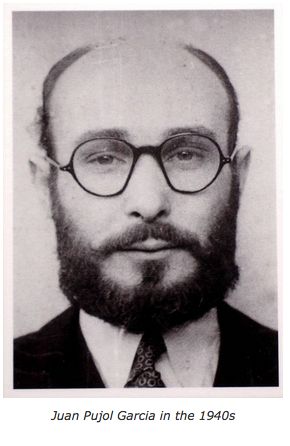
Pujol
followed orders. He strolled into the café and introduced himself to
an athletic, blue-eyed blond man sitting in the back. The agent greeted
him with a cold nod. His code name was Federico, and he was specially
trained to spot frauds. Pujol sat and started professing a devout—but
false—love for Hitler and the New Order. The rant was cunning and
bombastic. Off the top of his head, Pujol spun a rambling web of lies,
rattling off names of nonexistent diplomats whom he claimed were
friends. Impressed, Federico scheduled a second meeting.
Rendezvousing
at a beerhouse, Federico told Pujol that the Nazi spy ring—the
Abwehr—didn’t need more agents in Spain. Rather, they needed moles who
could snoop abroad. Pujol beamed and told the recruiter about his
passport. Federico nodded. A few days later, he told Pujol to go to
Lisbon and charm the embassy into awarding him an exit visa. When Pujol
got there, the embassy refused.
It looked like a dead end, but
again, Pujol’s gift of gab proved handy. At his hotel in Lisbon, he
befriended a portly, affable Galician man named Jaime Souza. On a night
out together, Souza unveiled a document that made Pujol’s heart leap—a
diplomatic visa. For the next week, Pujol accompanied Souza
everywhere: amusement parks, nightclubs, cabarets, and, eventually, a
casino. One afternoon, as the duo played roulette, Pujol pretended to
double over with stomach cramps. He told Souza to keep playing while he
ran back to the hotel. He raced to their room, opened Souza’s
suitcase, pilfered the visa, and snapped a few photographs. Then, he
returned to the casino floor as if nothing had happened.
Within
days, Pujol had forged the document. Upon returning to Spain, he showed
it to Federico: Pujol was in. The agent was so impressed, he took
Pujol under his wing, stocking him with invisible ink, ciphers, $3,000
in cash, and a code name: ARABEL—Latin for “answered prayer.” His first
assignment was to move to England, pose as a BBC radio producer, and
crib British intelligence.
Pujol, of course, had no interest in
actually spying for the Nazis. He wanted to be an Allied double agent.
So instead of following orders to go to Britain, he went to Portugal.
Confident the Allies would accept him now that he had access to German
secrets, he dashed to the British embassy and showed them the ink, the
ciphers, and the cash—he had everything a double agent needed. But the
British reply was clear: “No.” Pujol was crestfallen. “Why,” he
wondered, “was the enemy proving to be so helpful, while those whom I
wanted to be my friends were being so implacable?”
Despite its
name, Britain’s intelligence office was anything but. When the war
began, the office was a factory of bad ideas. In 1941, it tried
convincing the Germans that 200 man-eating sharks had been dumped in
the English Channel. A year later, it seriously considered staging the second coming of christ. (The plan was simple: A
jesus-like figure
would magically appear across the German countryside, perform miracles,
and preach peace.)
The decision to reject Pujol, however, was a
matter of politics. The Allies wanted to keep Spain out of the war, so a
Spanish double agent wasn’t enticing. Plus there was the minor detail
that Pujol didn’t know a thing about England. He had never been there.
He knew nothing about its military. He barely spoke the language. And
now, in order not to blow his cover with the Abwehr, he had to convince
the Nazis he was living there.
Without leaving Portugal,
Pujol bought a map of England, a tourist guidebook, and a list of
railway timetables—and began lying through his teeth. The Abwehr had
told him to recruit subagents for help. Pujol had a better idea: He’d
make them up. If something went sour, he could blame it on his
imaginary employees. When something went right, he’d take the credit.
With that, ARABEL started fabricating sources, spies, and stories.
Using newspapers and telephone books as inspiration, Pujol wrote
sprawling, baroque letters to the Abwehr that contained practically no
useful information at all—they were just meant to waste the agency’s
time. But Pujol knew he couldn’t keep up the ruse forever. If he wanted
the Abwehr’s trust, he’d need to start sending some legitimate
information. He asked for Britain’s help, but the embassy rejected him a
fourth and fifth time.
Then, by chance, some of ARABEL’s reports
struck too close to the truth. In one letter, he told the Germans that a
convoy of five Allied ships had left Liverpool for Malta. Little did
Pujol know, but the made-up report was, in reality, mostly correct.
When Britain’s spy circle—the MI5—intercepted the message, agents
panicked. A Nazi spy was loose in England! “The British were going
crazy looking for me,” Pujol later recalled. He pulled a similar stunt
weeks later, reporting that a major armada was departing Wales. This
time, the convoy didn’t exist. But U-boats and Italian fighter planes
scrambled to ambush it anyway, wasting tons of fuel and thousands of
man-hours. Now this grabbed the Allies’ attention. In April 1942, the
MI5 smuggled Pujol into London and hired him as part of its
double-cross system. The Brits were so impressed with his ability to
play a fervid Nazi, they code-named the amateur spy GARBO because, in
their opinion, he was the best actor in the world.
As a bona fide
double agent, GARBO’s network of imaginary spies ballooned. He
enlisted a traveling salesman, a cave-dwelling Gibraltarian waiter, a
retired Welsh seaman turned Fascist mercenary, an Indian poet nicknamed
RAGS, an obsessive-compulsive code-named MOONBEAM, and even an
employee at Britain’s Ministry of War. The bogus spies filed expense
reports; some earned real salaries, all funded by the Nazis. By war’s
end, GARBO had invented 27 personas. Working for the MI5 also meant
that Pujol finally had real military information at his fingertips. So
to build the Abwehr’s trust, he began giving away legitimate Allied
secrets, peppering the reports with enough white lies to throw off the
Nazis.
For
example, during Operation Torch—the campaign to invade North
Africa—three of GARBO’s imaginary agents reported seeing troops in
Scotland, prepping for an invasion. (There weren’t any there.) The
phantom agents spread rumors that Norway might be attacked, while others
claimed that Dakar, Senegal, was next. The news confused the Nazis and
kept them ill-prepared. To save face, GARBO wrote the Abwehr a letter
one week before the true African invasion, detailing exactly when and
where the Allies would attack. The information could have put thousands
of troops at risk, except that the MI5 intentionally delayed the letter
so it arrived one day late. The stunt saved lives and made GARBO look
like an oracle.
Other stunts boosted his star power. When the
Nazis wanted to bomb civilian trains in England, they asked GARBO for a
train timetable. He sent an outdated one. When they wanted a book
containing Royal Air Force secrets, GARBO mailed it in a cake with all
the up-to-date pages deviously torn out. When Germans shot down a
civilian plane between Portugal and London, killing everybody
aboard—including Hollywood actor Leslie Howard—GARBO lambasted the
Abwehr. One of his make-believe agents, a pilot, could have been
onboard! Embarrassed, the Germans never attacked another civilian
aircraft on that route.

By June 1943, Pujol had become one of
Germany’s most prized spies. The Abwehr sent him new ciphers and vials
of invisible ink—which made it easier for the MI5 to crack enemy codes.
Meanwhile, the Nazis circulated a memo comparing him to a 45,000-man
army. Pujol, who’d failed at school, at military service, and at
business, was a virtuoso con man. And now, he had all of the
ingredients he needed to cook up his biggest lie yet.
England's country lanes were choked with troops.
It was early 1943, and planes, jeeps, and tents were everywhere.
Locals joked that the island would sink under all the weight. To German
reconnaissance aircraft, it was obvious that something big was about
to happen. GARBO’s job wasn’t to hide the impending French invasion—it
was to convince the Germans that it was going to happen in Calais, 200
miles north of Normandy. If he succeeded, most of the Nazi soldiers
would be waiting in the wrong place when the real invasion happened.
But few people believed the ploy could actually work. Tricking Hitler,
intelligence officer Ralph Ingersoll once said, was the equivalent of
“putting a hooped skirt and ruffled pants on an elephant to make it look
like a crinoline girl.”
To
pull it off, GARBO had to convince the Nazis that a nonexistent
million-man army was assembling in southeastern England. The imaginary
army was given a real name: the First United States Army Group, or
FUSAG. According to Stephan Talty’s book
Agent Garbo, the
British spared no effort or expense to make the hoax look legit.
Inflatable decoys—mock tanks and boats—dotted harbors and farms. Fake
hospitals were erected. Bulldozers plowed faux airstrips, and soldiers
built hundreds of phony wooden aircraft. When a bogus oil plant was
constructed near Dover, the Brits requisitioned wind machines from a
movie studio to blow dust across the Channel to make the construction
site more believable. Newspapers showed King George VI inspecting the
artificial plant. Carrier pigeons were released in enemy territory with
property of fusag IDs wrapped around their legs, and special machines
stamped tank tracks along dusty roads. Newspapers published fake letters
complaining about the ruckus all the imaginary soldiers were causing.
And as the date of the real invasion neared, General Patton appeared
across south-eastern England to rally the make-believe troops.
GARBO
“sent” his best agents to southeast England to report on the activity.
Meanwhile, other phony agents reported seeing bombers in Scotland,
which made an additional attack on Norway look imminent. The reports
made Hitler so nervous that he kept 250,000 much-needed troops
stationed in Scandinavia. By May 1944, German High Command was utterly
confused. Field Marshal Erwin Rommel was convinced FUSAG was real. Just
before D-day, the Allies bombed 19 railroad junctions near Calais—and
none in Normandy. Accompanied with GARBO’s reports, the bombings led
most Nazi bigwigs to agree: All signs pointed to Calais.
At 6:30
a.m. on June 6, 1944, the first Allied troops stormed onto the sands of
Omaha Beach, Normandy. D-day had begun. Although the first boats met a
stiff resistance, the Nazis were relatively clueless. The German
Seventh Army stationed nearby was snoozing in its barracks. General
Hans Speidel had told both his armies to reduce their states of
readiness because of gloomy weather. General Friedrich Dollmann was so
convinced June 6 would be a slow day that he scheduled war games.
Meanwhile, Rommel had taken the day off to celebrate his wife’s
birthday. (The day before, as the Allies prepared history’s biggest
invasion, he was picking wildflowers.) When Berlin learned that forces
were landing in Normandy, the staff refused to even wake Hitler. The
ploy had worked—almost nobody took the invasion seriously. Nazi brass
thought it was a scheme to distract them from the real invasion—at
Calais.

Two
days went by. Tens of thousands more troops hit the beaches, and
German generals still refused to send in serious reinforcements: They
were still waiting for the fake army to attack. On June 9, a desperate
General Gerd von Rundstedt begged Hitler to send the Panzers, the Axis’s
fearsome tank squads. Hitler finally caved. This was terrible news for
the Allies: The Panzers could cripple the invasion.
But early
that morning, GARBO sent a message about the fake army that would
change history: “I am of the opinion, in view of the strong troop
concentrations in southeastern and eastern England, which are not
taking part in the present operations, that these operations are a
diversionary maneuver designed to draw off enemy reserves in order then
to make a decisive attack in another place ... it may very probably
take place in the Pas-de-Calais area.”
The message was forwarded immediately to Berlin. Hitler’s personal intelligence officer underlined the word
diversionary
and handed it off to a higher official, who laid it on Hitler’s desk.
The Abwehr chimed in confirming the information. Later that night,
Hitler read GARBO’s message; shortly after, an order beamed from High
Command: “The move of the 1st SS Panzer Division will therefore be
halted.” Suddenly, nine of Germany’s meanest armored divisions—all bound
for Normandy—stopped dead in their tracks and turned around to defend
Calais.
It was GARBO’s greatest lie, and it arguably turned the
tide of the war. The fake-out saved tens of thousands of Allied lives
and secured a foothold on the continent. A month later, 22 German
divisions were still waiting in Pas-de-Calais for the fake army. By
December, when Allies had regained France, German commanders
still
believed FUSAG was real. Berlin was so convinced by GARBO’s reports
that it awarded him an Iron Cross—an honor usually reserved for troops
on the front line. Months later, the King of England followed suit and
made Pujol a member of the Most Excellent Order of the British
Empire—one of the nation’s greatest honors. The self-made spy became
the first and only person decorated by both sides.
D-day was the
beginning of the end. Hitler killed himself the next spring, and the
Abwehr told GARBO to give up—they’d never realized they had a double
agent on their hands. By then, his network of phony agents had stolen
£17,554—nearly $1 million to- day—from Nazi coffers. Soon, Pujol fled
to South America to be, as he put it, “forgotten, to pass unnoticed and
to be untraceable.” Four years later, the MI5 reported that he had
died of malaria while exploring Africa.
But this too was another
brilliantly executed lie—a rumor spread to shake off any vengeful Nazi
loyalists. Pujol, then 36, was alive and well in Venezuela, where his
life became boring and normal again. He married, had two sons, opened a
book- store, and got a job with Shell Oil as a language teacher. He
even tried going back into the hotel business, where, again, he failed
miserably. He lived off the radar until 1984, when the enterprising
journalist Nigel West found him after a decade-plus search. That year, a
72-year-old Pujol returned to London for an emotional reunion. His
former MI5 colleagues were gobsmacked. “It can’t be you,” one of them
burst. “You’re dead!”
West took Pujol to Omaha Beach for D-day’s
40th anniversary. When the spy saw the cemetery—with its long, neat
rows of white headstones—he dropped to his knees and burst into tears.
He felt responsible for each grave. But as the day wore on, word
circulated that Pujol was there. Hordes of gray-haired men flocked to
him, begging to shake his hand. One man, surrounded by family and
fellow veterans, took Pujol by the arm and beamed. “I have the pleasure
of introducing GARBO, the man who saved our lives.” Again, tears
flooded Pujol’s eyes. This time, though, he smiled.






